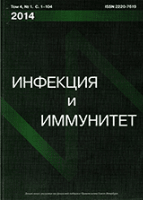
Infektsiya i Immunitet
Scope & Guideline
Innovating insights into disease prevention and immune response.
Introduction
Aims and Scopes
- Infectious Disease Mechanisms:
Research articles delve into the molecular and cellular mechanisms by which pathogens invade and affect host systems, including studies on viruses, bacteria, fungi, and parasites. - Immunological Responses:
The journal emphasizes studies on the immune system's response to infections, including the characterization of immune cells, cytokine profiles, and the role of antibodies in fighting infections. - Vaccine Development and Efficacy:
A significant focus lies on vaccine research, including the development of new vaccines, evaluation of immunogenicity, and the impact of vaccination on population health. - Antimicrobial Resistance:
The journal addresses the growing concern of antimicrobial resistance, presenting research on the mechanisms of resistance in various pathogens and strategies to combat this issue. - Clinical and Epidemiological Studies:
Clinical studies provide insights into the epidemiology of infectious diseases, patient outcomes, and the effectiveness of treatment protocols in diverse populations. - Public Health and Infection Control:
Articles also cover public health strategies for infection prevention and control, particularly in the context of outbreaks and pandemics.
Trending and Emerging
- COVID-19 Research:
There is a significant increase in publications related to COVID-19, encompassing studies on virus variants, vaccine efficacy, and long-term effects of the infection. - Immunological Memory and Long-COVID:
Emerging studies focus on the long-term immunological responses to COVID-19 and the persistence of immune memory, contributing to our understanding of post-viral syndromes. - Innovative Vaccine Technologies:
Research on novel vaccine platforms, including mRNA vaccines and vector-based vaccines, is gaining traction as the field seeks to enhance immunogenicity and efficacy. - Microbiome and Infectious Diseases:
An increasing interest in the relationship between the microbiome and infectious diseases is evident, highlighting how gut health can influence susceptibility to infections. - Personalized Medicine in Infectious Diseases:
There is a growing trend towards personalized approaches in treatment and prevention, including tailored vaccines and therapies based on individual immune responses. - Emerging Infectious Diseases and Zoonoses:
Research on emerging infectious diseases, particularly those of zoonotic origin, is on the rise, reflecting a global focus on preventing future pandemics.
Declining or Waning
- Traditional Infectious Disease Studies:
There seems to be a decline in studies focusing on classical infectious diseases that were previously predominant. This includes less emphasis on older pathogens and their epidemiological impact. - Non-viral Infectious Agents:
Research on non-viral infectious agents, such as certain bacterial infections, appears to be waning, possibly overshadowed by the urgent focus on viral diseases, particularly COVID-19. - Basic Immunology without Clinical Application:
There is a noticeable reduction in fundamental immunology studies that do not directly link to clinical applications or public health implications. - Longitudinal Studies in Established Populations:
Longitudinal studies tracking established infectious diseases in well-defined populations seem to be less frequent, as the journal shifts towards more immediate and impactful research.
Similar Journals
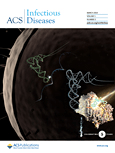
ACS Infectious Diseases
Advancing the Science of Infectious Disease ManagementACS Infectious Diseases is a premier journal in the field of infectious diseases, published by the American Chemical Society. With an impressive Impact Factor that places it in the Q1 category for Infectious Diseases in 2023, the journal serves as an essential resource for researchers, healthcare professionals, and students dedicated to the study of infectious agents and their impact on public health. Established in 2015, the journal is committed to publishing cutting-edge research that enhances our understanding of infectious diseases and fosters the development of innovative interventions. Although not an open access journal, it provides a platform for high-quality research that influences policies and practices in the field. With an address located at 1155 16TH ST, NW, WASHINGTON, DC 20036, ACS Infectious Diseases is an authoritative voice in advancing the science and practice of infectious disease management.
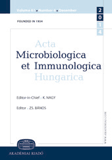
ACTA MICROBIOLOGICA ET IMMUNOLOGICA HUNGARICA
Innovating research for a healthier tomorrow.ACTA MICROBIOLOGICA ET IMMUNOLOGICA HUNGARICA is a distinguished academic journal published by AKADEMIAI KIADO ZRT, focusing on significant advancements in the fields of microbiology, immunology, and infectious diseases. Established in 1994, this journal serves as a vital platform for researchers, professionals, and students keen on exploring the complexities of microbial interactions and immune responses. With a current Impact Factor reflecting its rank within the Q3 categories for Immunology, Microbiology, and Infectious Diseases, it retains a critical position in disseminating innovative research. Although not open access, the journal provides extensive insights disseminated through various academic databases, ensuring a broad reach within the scholarly community. Its convergence over three decades indicates a robust commitment to excellence in scientific inquiry and knowledge sharing. As it moves towards the future, ACTA MICROBIOLOGICA ET IMMUNOLOGICA HUNGARICA continues to uphold its legacy of fostering collaborative research initiatives that contribute to the understanding and treatment of microbial diseases globally.

Emerging Microbes & Infections
Unlocking insights into emerging infections.Emerging Microbes & Infections is a premier open access journal, published by Taylor & Francis Ltd since 2012, dedicated to advancing the understanding of microbial infections and their implications in human health. With an impressive Q1 ranking across multiple categories—including Drug Discovery, Epidemiology, Immunology, and Infectious Diseases—this journal is at the forefront of research in the microbiological sciences. Covering a diverse range of topics, it serves as a vital resource for researchers, healthcare professionals, and students alike. The journal's commitment to open access ensures worldwide dissemination of cutting-edge findings, fostering collaboration and innovation in tackling challenges posed by emerging infections. As part of the thriving academic community in the United Kingdom, Emerging Microbes & Infections plays a crucial role in shaping the future of infectious disease research and public health.

Infectious Microbes & Diseases
Unraveling the complexities of microbes and their impact.Infectious Microbes & Diseases, published by Lippincott Williams & Wilkins, is a premier journal dedicated to the exploration and understanding of infectious diseases, microbiology, and epidemiology. With its focused scope and robust peer-review process, the journal aims to disseminate high-quality research that contributes to advancements in the field, making it an essential resource for researchers, healthcare professionals, and students alike. Established in 2019, it has quickly gained recognition, achieving a Q3 rating in categories such as Epidemiology, Infectious Diseases, and Medical Microbiology in 2023, and ranking in the top half of its field within Scopus metrics. Although currently offered as a subscription-based journal, Infectious Microbes & Diseases significantly enriches its disciplines by inviting innovative research and critical review articles, thus playing a vital role in combating the global challenges posed by infectious diseases.
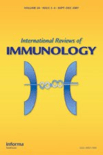
INTERNATIONAL REVIEWS OF IMMUNOLOGY
Elevating Immunology: Where Science Meets PracticeINTERNATIONAL REVIEWS OF IMMUNOLOGY, published by Taylor & Francis Inc, is a leading academic journal that has been a cornerstone of immunological research since its inception in 1986. With an impressive impact factor and ranked in the top quartiles of its field (Q2 in both Immunology and Allergy), this journal offers a critical platform for the dissemination of influential findings and advancements within immunology. Spanning a diverse array of topics, from basic immune mechanisms to clinical applications, it aims to support the global scientific community in enhancing immunological understanding and therapeutic interventions. Researchers and professionals alike benefit from insights provided by renowned contributors, ensuring that the journal remains relevant in a rapidly evolving field. Directly accessible through subscription or institutional access, INTERNATIONAL REVIEWS OF IMMUNOLOGY is committed to fostering collaboration and innovation, making it an essential resource for anyone involved in immunological research and practice.
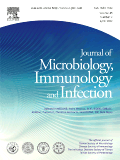
JOURNAL OF MICROBIOLOGY IMMUNOLOGY AND INFECTION
Exploring innovations in infectious disease research.Welcome to the Journal of Microbiology Immunology and Infection, a premier academic publication established in 1998 and now proudly owned by Elsevier Taiwan. As an Open Access journal since 2016, it provides unrestricted access to groundbreaking research in the fields of immunology, microbiology, and infectious diseases, making it an essential resource for researchers, practitioners, and students alike. The journal holds impressive rankings, including Q1 status in categories such as Infectious Diseases and Microbiology (medical), and a notable 92nd percentile in its Scopus ranking for Medicine - Infectious Diseases. With a dedicated focus on advancing knowledge and fostering collaboration within the scientific community, the Journal of Microbiology Immunology and Infection is committed to publishing high-impact research that significantly influences practice and policy in healthcare and life sciences. The journal is also recognized for its contribution to the ongoing dialogue surrounding contemporary issues in immunology and infection, positioning it as a vital platform for scholarly exchange and innovation.

Virulence
Exploring the Complexities of Pathogen BehaviorVirulence, a leading academic journal published by Taylor & Francis Inc, is dedicated to advancing the understanding of virulence mechanisms in pathogens across various infectious diseases. Since becoming an Open Access publication in 2018, it has broadened the accessibility of cutting-edge research for a global audience, promoting collaboration and knowledge-sharing among researchers, professionals, and students alike. With a significant impact within its field, the journal boasts impressive 2023 quartile rankings: Q2 in Immunology and Q1 in both Infectious Diseases and Microbiology, alongside notable standings in Parasitology. The current Scopus rankings reinforce its prominence, with high percentiles indicating its influence and relevance in advancing scientific inquiry. Covering a period from 2010 to 2024, Virulence serves as an essential platform for innovative research that not only addresses the critical challenges in understanding pathogen behavior but also contributes towards global health solutions, establishing it as a vital resource in the rapidly evolving fields of immunology, microbiology, and parasitology.

Infectious Diseases and Clinical Microbiology
Fostering collaboration in the fight against infectious agents.Infectious Diseases and Clinical Microbiology is a pivotal journal dedicated to advancing our understanding of infectious diseases through rigorous scientific research and clinical practices. Published by DOC DESIGN INFORMATICS CO LTD, this journal serves as a vital platform for researchers, healthcare professionals, and students keen on enhancing their knowledge of microbiological sciences and the clinical implications of infectious agents. With an ISSN of 2667-646X, it aims to disseminate significant findings in the field, enriching the scholarly dialogue surrounding infectious diseases. While currently operating under a traditional access model, the journal encourages global collaboration and knowledge sharing, striving to make a meaningful impact in tackling the challenges posed by infectious diseases. Its content aims to bridge the gap between laboratory research and clinical application, making it an essential resource in the contemporary landscape of global health.

Immunity Inflammation and Disease
Advancing knowledge in immune responses and inflammatory diseases.Immunity, Inflammation and Disease is a premier open-access journal published by WILEY, dedicated to advancing the field of immunology and allergy. Launched in 2013, this journal has established itself as a significant platform for researchers and professionals to disseminate high-quality research findings and innovative insights that address critical issues in immune responses and inflammatory diseases. With an impact factor that reflects its growing influence and a current ranking in Q3 for Immunology and Q2 for Immunology and Allergy, this journal serves a diverse audience keen on exploring cutting-edge developments. Researchers are encouraged to submit their work to share their findings with a global reach, foster collaboration, and enhance the understanding of immune mechanisms and therapeutic strategies. Accessible since its inception, Immunity, Inflammation and Disease is committed to open science, ensuring that vital research is freely available for the advancement of knowledge within the academic community and beyond.
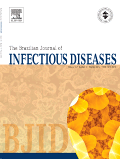
Brazilian Journal of Infectious Diseases
Fostering collaboration for impactful health solutions.The Brazilian Journal of Infectious Diseases, published by Elsevier Brazil, is a premier open-access journal dedicated to advancing research and clinical practice in the field of infectious diseases. Since its inception in 2001, this journal has been pivotal in disseminating innovative studies and reviews that inform healthcare professionals and researchers alike. With an impressive impact factor reflected by its ranking in the second quartile for Infectious Diseases and third quartile for Medical Microbiology in 2023, the journal ranks #127 out of 344 in medicine – infectious diseases and #61 out of 140 in medical microbiology, showcasing its reputable standing in the scientific community. The Brazilian Journal of Infectious Diseases invites contributions that highlight significant findings, novel methodologies, and critical reviews aimed at enhancing patient care and public health initiatives. With an international readership and a focus on pressing issues in infectious diseases, it serves as an essential platform for knowledge exchange and collaboration among scholars and practitioners across Brazil and beyond. By reinforcing the importance of open access to scientific literature, this journal not only promotes transparency but also enhances the global discourse surrounding infectious diseases.